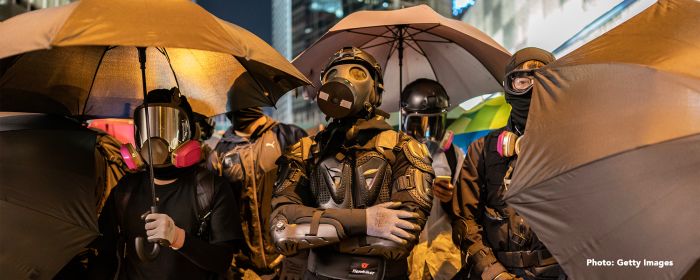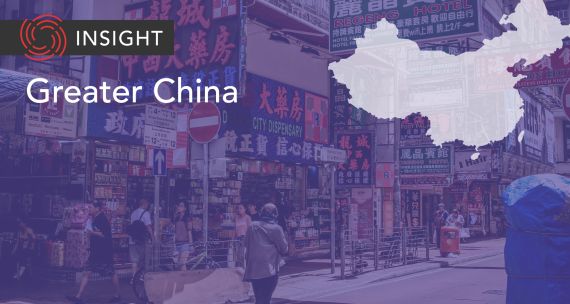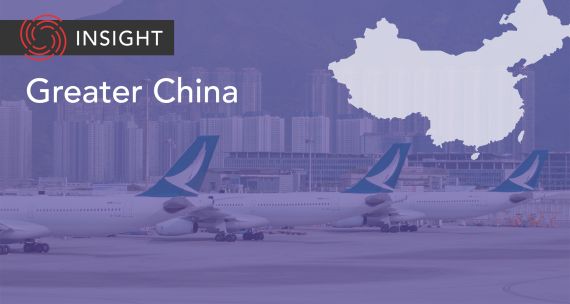July 1 marks the 25th anniversary of the United Kingdom’s formal ‘handover’ of Hong Kong to the People’s Republic of China. The 1997 transfer of sovereignty, which followed 155 years of British colonial rule, included conditions to preserve certain rights and freedoms for at least 50 years. In what is shaping up to be a week of anniversaries and milestones for the territory of 7.5 million, June 30 marks the second anniversary of the implementation of Hong Kong’s contentious National Security Law (NSL), and July 1 is also the first day on the job for the city’s new Chief Executive, John Lee. Amid these tumultuous and uncertain times, the city is planning various celebratory events, including a visit by President Xi Jinping under the slogan “A New Era – Stability. Prosperity. Opportunity.”
In this Asia Watch Special Edition dispatch, we reflect on Hong Kong’s development since 1997, how the National Security Law and the city’s experience with the COVID-19 pandemic have begun to transform the city in new ways, and we highlight some potential trajectories for a special administrative region of China that remains one of the most developed cities in the world.
At this crossroads of history, it is also worth pausing to take stock of the Canada-Hong Kong relationship. After all, what happens in Hong Kong matters to Canada, as our ties and connections run deep – from immigration and human rights to business and trade. An oft-cited 2011 APF Canada survey estimated there were some 300,000 Canadians in Hong Kong – Canada's second-largest expatriate community after the U.S. It also estimated that 170,000 graduates of Canadian universities were residing in Hong Kong. On the Canadian side, between the mid-1980s and mid-1990s, large waves of Hongkongers moved to Canada, with hundreds of thousands (estimates range from 215,000 to 500,000) now residing in Canada. After tapering off in the mid-1990s, numbers are starting to grow again. In 2021, Canada welcomed 2,295 new permanent residents from Hong Kong, more than double the previous year.
These strong people-to-people ties, combined with Hong Kong's status as a long-time global economic and financial hub, have seen Hong Kong play a significant role in Canadian business and trade. In 2021, bilateral trade was valued at C$4 billion, two-way financial assets were worth C$38 billion, and majority-owned affiliates in Canada and Hong Kong directly employed 37,000 people, according to Canadian government statistics.
These solid ties aside, there is no doubt that Hong Kong, especially over the last three years, is in a state of flux and dramatic change as Beijing asserts more oversight and control of the city. The legacies of the first half of Hong Kong’s 50-year ‘grace period’ will continue to drive and haunt the second. Today, our analysts outline some of the dilemmas surrounding what remains of Hong Kong’s independence from mainland China and explore the evolving situation in Hong Kong and its impacts on the bilateral relationship.
A Political Landscape 25 Years in the Shifting
A declaration and ‘mini-constitution’ for the next half-century
The 1997 ‘handover’ from Britain to the People’s Republic of China was the product of the Sino-British Joint Declaration of 1984. Under a ‘one country, two systems’ framework, China promised that “the current social and economic systems in Hong Kong will remain unchanged” for at least 50 years through the creation of a Special Administrative Region (SAR) “governed by Hong Kong people” appointed by Beijing. The declaration also guaranteed freedoms of expression, assembly, and the press, along with the city’s political autonomy and independent judiciary. While both Britain and China excluded local Hong Kong representatives from the talks, Beijing handpicked prominent residents – mostly from the business elite – to help draft the new SAR’s ‘Basic Law.’ Despite great anxiety over what would follow the handover, 1997 came and went without noticeable disruption to Hongkongers' way of life.
The rise and decline of ‘one country, two systems’
The new system essentially held for the first decade and a half. After protesters forced the Hong Kong government to shelve proposed national security legislation in 2003, a stalemate between a cautious administration and a wary civil society ensued. However, the inauguration of President Xi Jinping in 2013 and the publication of a 2014 White Paper on Hong Kong foreshadowed a hardline turn. Mass demonstrations in 2014 and 2019 were met with police violence that fuelled further demands from protesters. A new generation of young activists has been increasingly swept up in the criminal justice system, while an electoral surge in pro-democracy and ‘localist’ legislators disintegrated under loyalty oaths, disqualifications, and mass arrests. Meanwhile, China has declared the 1984 Declaration non-binding and “without meaning.” Though ‘one country, two systems’ is still the guiding maxim, in theory, increasing pressure from Beijing to suppress civic discontent and growing incentives for the city’s elite to align themselves with Beijing have eroded this principle in practice.

Fading echoes of the ‘revolution of our times’
On June 30, 2020, China’s National People’s Congress (NPC) took the extraordinary step of inserting a National Security Law into the Basic Law, bypassing the city’s legislative processes. And last year, the NPC directly amended the Basic Law to overhaul Hong Kong’s electoral system. Erstwhile commitments to guarantee basic civil liberties have also faded after the arrests of hundreds of activists and the disbanding of numerous civil society organizations. Despite mounting repression, however, grassroots organizing efforts, both in the city itself and throughout its growing diaspora, have persisted and even proliferated, echoing the spirit of community, decentralization, and mutual aid articulated in the 2014 and 2019 movements.
Impacts of National Security Law on Hong Kong’s Democratic Ideals
A transformed political landscape
Tomorrow, John Lee Ka-chiu will become Hong Kong’s Chief Executive, the city’s top political office, after securing 99.2 per cent of the vote via an Election Committee dominated by Beijing loyalists. A hardliner, Lee oversaw last year’s mass arrests of opposition figures, including more than 50 who organized a pro-democracy primary election 10 days after Beijing imposed the NSL on the city. Flagship pro-democracy parties, including the Democratic Party, the Civic Party, and the League of Social Democrats, were subsequently absent from the Legislative Council elections in December. Lee will become the city’s sixth chief executive and is the first former security chief to take the top job.

Focus on national security eclipses the rule of law
While Hong Kong’s Basic Law and the ‘one country, two systems’ framework were supposed to protect the city’s independent judiciary and provide Hongkongers with civil-rights protections like those in other common-law jurisdictions such as Canada, the passing of the NSL has had a profound impact on its criminal justice system. It allows Beijing increased power to interpret the NSL and have a say in the selection of judges who hear national security cases, ultimately influencing the outcomes of cases. Numerous convictions of activists involved in the 2019 protests show how the NSL can be used against political opponents. According to the World Justice Project, however, Hong Kong’s legal system remains robust, and in 2021 it received a score of 0.75 on a scale of 0 to 1, higher than the Asia Pacific region-wide average of 0.6.
What new chapter for Hong Kong?
Hong Kong’s relative independence and unique identity will likely continue to diminish under Lee’s rule. The policeman-turned-politician vowed to tackle “fake news” and promised more national security legislation, in addition to declaring a war against the “West’s propaganda over the erosion of rights and freedoms in the city.” While some experts argue that it is in China’s interest to preserve the rule of law in Hong Kong to retain its status as an international financial hub, it is undeniable that Hong Kong’s democracy, even if limited, has been slowly regressing since the handover, and even more so since the imposition of the NSL.

Hong Kong’s Status as Asia’s Economic Darling in Flux
COVID regulations remain strict
Hong Kong has long maintained a reputation as an international business hub and an entry point to mainland China – and the rest of Asia. However, international travel to the city has been severely restricted since the outbreak of COVID-19 and the strict regulations imposed by Beijing to achieve its “zero-COVID” policy. Throughout much of the COVID period, arrivals have been required to quarantine for 21 days, generating a backlash from many in the finance industry and prompting expatriate families to leave the city. Domestic business ties to the mainland are also stronger than ever, due partly to the less stringent travel restrictions and the growth of China-based businesses.
Still open for business
While the economic development of mainland China and the growth of its domestic market have increased competition for Hong Kong, with Shanghai and Shenzhen seeing almost 16 times more in IPO value than Hong Kong in the past year, Hong Kong still has much to offer. Despite the turbulence caused by the 2019 protests and 2020 COVID restrictions, the territory has retained its third-place rank in the World Bank’s Ease of Doing Business index. This is due primarily to its remarkably low corporate income tax rate, at only 16.5 per cent. And Hong Kong’s rise to fourth place in the Global Financial Centres Index in 2021 is attributable to its deep capital pools, popular stock market, and access to mainland China.
An evolving relationship with Canada
Canada’s investment relationship with Hong Kong has waned in recent years. According to data from the Asia Pacific Foundation’s Investment Monitor, Canadian investment in Hong Kong fell in 2019 and has not returned to pre-2019 levels, despite the resurgence of Canadian investment in other Asia Pacific economies. In 2021, Hong Kong only received C$206 million in Canadian investments, less than half of what it received in 2020 and almost C$30 million less than it received in 2019. This could be due to several factors, including the push for diversification that many companies embraced following supply chain crises experienced during the pandemic and the increasing attractiveness of other economies in the Asia Pacific.
Crackdowns on Media, Education are Shrinking Hong Kong’s Information Space
Bastion of freedom no more
Hong Kong was once a bastion of media freedom. But this year, Reporters without Borders downgraded its press freedom ranking by a staggering 80 points, calling it an “unprecedented setback.” While the Basic Law once guaranteed such freedoms, the 2020 NSL has dramatically re-shaped the city’s information space. In 2021, the government forced the closure of pro-democracy news outlets like Apple Daily and Stand News and stripped public broadcasting service Radio Television Hong Kong of its editorial independence. Many other media platforms have begun to self-censor, hoping to survive the current dragnet. Messaging platforms like LIHKG and Telegram remain relatively safe spaces for discussing pro-democracy perspectives and updates, but last month authorities debated suspending public access to Telegram. It may only be a matter of time before these spaces also begin to disappear.
Not leaving them kids alone
Other NSL-related measures are being introduced into the city’s education system. All university students are required to take a course on national security that lays out starkly the harsh consequences of violating the law. In high schools, a course on critical thinking has been replaced by one that emphasizes patriotic education – an effort to bolster young Hongkongers’ loyalty to mainland China. To comply, teachers are, in effect, now responsible for possibly informing on their students. As with those in the media, the chilling effect is prompting people to leave the profession.
Hope springs eternal
Some bright spots remain. For example, while more websites are being pulled out of the information space, Hong Kong is not yet under China’s ‘Great Firewall.’ If Beijing continues to see Hong Kong as a place for business for the next 25 years, overly harsh censorship may further harm foreign investment in the city. Meanwhile, the diaspora maintains public spaces where Hongkongers – including the many who have recently left – can carry on political, media, and educational activities relatively safely (although such activities still risk prosecution in Hong Kong and/or mainland China under the NSL’s extraterritorial provisions). But a looming issue remains: Hong Kong’s media and education system pre-NSL encouraged critical thinking and had the potential to hold the powerful to account. The shifting information space will make that much more difficult.

A Special Economic Zone for the 21st Century?
From our President and CEO, Jeff Nankivell . . .
There is nothing in the foundational documents of the Hong Kong SAR to say that some version of ‘one country, two systems' ends in 2047; if no legislative action is taken by June 30th, 2047, life on July 1st, 2047 continues on the same basis.
The key PRC leaders responsible for Hong Kong policy – all men, in their late sixties – made their careers in the heyday of China’s reform and opening period, when the establishment of special economic zones was a cornerstone of national policy, with Shenzhen being the most prominent (and successful) example.
Beijing’s actions since 2019 strongly suggest that this is these leaders’ vision of Hong Kong in 2047: a capitalist enclave continuing to offer unique advantages such as a freely convertible currency, regulators and courts that are internationally trusted as basically sound and of world-class quality, deep pools of capital for investment into mainland China and from mainland China to the rest of the world, low taxes, and light-touch regulation of business; all of this, but with political and security control firmly in the grip of the Communist Party and central security organs of the PRC, and no possibility to be a place for challenges to China’s one-party rule to arise.
What remains to be seen is the extent to which the general population of Hong Kong and the international community within Hong Kong and abroad will be sufficiently comfortable with such a formulation for Hong Kong to continue to be a dynamic and systemically important hub.
Some key leading indicators to watch for in the coming years include whether information flows remain unconstrained (including full access to the global internet, with no PRC-style “Great Firewall” controls), whether courts and regulators continue to be seen as competent and corruption-free in dealing with commercial matters, whether Hong Kong’s world-class universities will continue to attract top faculty and students and engage fully in global dialogues, whether Hongkongers with the means to send their children abroad for education will abandon local options in large numbers, and whether media and civil society organizations are able to retain some ability to call out government and corporate incompetence and malfeasance.
The answers to these questions will determine whether the unique governance experiment launched 25 years ago survives another 25 years – and perhaps beyond.
- Jeff Nankivell is the President & CEO of the Asia Pacific Foundation of Canada and former Consul General of Canada in Hong Kong and Macao (2016-2021).
READ MORE:
Council on Foreign Relations: Hong Kong’s freedoms: What China promised and how it’s cracking down
Dissent: The future of Hong Kong
South China Morning Post: History of Hong Kong protests: riots, rallies and brollies
The Guardian: Hong Kong: Five arrested for sedition ahead of 25th anniversary of British handover
South China Morning Post: Incoming Hong Kong leader John Lee promises more aggressive approach to countering ‘fearmongering and badmouthing’ by city’s critics
The Wall Street Journal: China’s Xi to visit Hong Kong, a city of dashed democracy dreams 25 years after handover
Al Jazeera: As Hong Kong sinks deeper into isolation, foreign firms despair
Bloomberg: Chinese firms are dominating key parts of Hong Kong’s economy
EuroCham in Hong Kong: EuroCham survey on the impact of Covid-19 on the business community
Al Jazeera: ‘No room for debate’: Hong Kong outlines security law for schools
The Guardian: Free media in Hong Kong almost completely dismantled – report
Nikkei Asia: Hong Kong’s independent media fight to survive
This Asia Watch Special Edition Dispatch was brought to you by APF Canada research analysts, including Charlotte Atkins, Scott Harrison, Quinton Huang, Charles Labrecque, Tristan Li, and Erin Williams.




